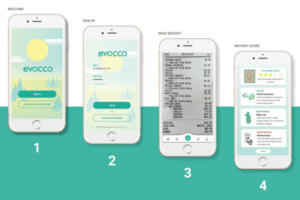 We have certainly seen a large number of companies looking to offset their greenhouse gas emissions and reduce their carbon footprints. A lot of this effort comes down to more sustainable sourcing, which tends to make environmental-conscious consumers happy. But for consumers, it is often difficult to measure the climate impact of what we eat. Well, I just read about an Irish start-up that can help. Dublin-based Evocco lets you track, improve, and offset the climate impact of your food purchases based on your receipt. Users photograph their grocery receipt using the Evocco app, which identifies the food products by reading the printed text and using machine learning. It then calculates the carbon footprint based on the store’s location and by checking the type, weight, and origin of a food against a database maintained by Eaternity, a life cycle assessment company based in Switzerland. And while it is not possible to measure the impact of everything on your receipt, if the receipt doesn’t contain enough data on a product, Eaternity gives an estimate based on similar products and reference points such as national import and export statistics, which determine where a product is likely to have come from. It may still be a work in progress, but it is a step in the right direction. And now on to this week’s logistics news.
We have certainly seen a large number of companies looking to offset their greenhouse gas emissions and reduce their carbon footprints. A lot of this effort comes down to more sustainable sourcing, which tends to make environmental-conscious consumers happy. But for consumers, it is often difficult to measure the climate impact of what we eat. Well, I just read about an Irish start-up that can help. Dublin-based Evocco lets you track, improve, and offset the climate impact of your food purchases based on your receipt. Users photograph their grocery receipt using the Evocco app, which identifies the food products by reading the printed text and using machine learning. It then calculates the carbon footprint based on the store’s location and by checking the type, weight, and origin of a food against a database maintained by Eaternity, a life cycle assessment company based in Switzerland. And while it is not possible to measure the impact of everything on your receipt, if the receipt doesn’t contain enough data on a product, Eaternity gives an estimate based on similar products and reference points such as national import and export statistics, which determine where a product is likely to have come from. It may still be a work in progress, but it is a step in the right direction. And now on to this week’s logistics news.
- Egypt’s Suez Canal blocked by huge container ship
- Amazon begins testing Rivian electric vans in San Francisco
- Walmart opens online marketplace to non-US vendors
- British drone delivery network takes flight in testing round
- Starbucks to improve sustainable coffee sourcing
- Railroad megamerger could be boon for shippers
- Postal Service puts parcels at head of line in reform plan
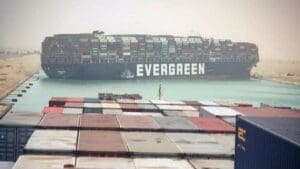 Port congestion has caused a lot of shipping delays over the course of the last year. But the situation in the Suez Canal is a bit different than regular congestion. The Suez Canal is one of the world’s busiest trade routes, accounting for about 12 percent of global trade. This week, a giant container ship the length of four football fields has become wedged across the canal, blocking traffic in both directions. The 200,000-ton ship ran aground and became lodged sideways across the waterway on Tuesday, leaving dozens of vessels stuck, waiting for rescue boats. Egypt has reopened the canal’s older channel to divert some traffic until the grounded ship can move again. Reports suggest it could be weeks before the ship is moved.
Port congestion has caused a lot of shipping delays over the course of the last year. But the situation in the Suez Canal is a bit different than regular congestion. The Suez Canal is one of the world’s busiest trade routes, accounting for about 12 percent of global trade. This week, a giant container ship the length of four football fields has become wedged across the canal, blocking traffic in both directions. The 200,000-ton ship ran aground and became lodged sideways across the waterway on Tuesday, leaving dozens of vessels stuck, waiting for rescue boats. Egypt has reopened the canal’s older channel to divert some traffic until the grounded ship can move again. Reports suggest it could be weeks before the ship is moved.
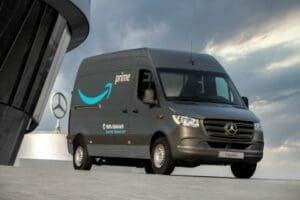 As I mentioned earlier this week, Amazon is continuing its course of supply chain innovation. Last month, the company began testing its electric delivery vans in Los Angeles as part of its Climate Pledge. Now, Amazon is expanding the use of the Rivian electric van to San Francisco, making the Bay Area the second of 16 total cities the company expects to bring its Rivian-sourced EVs to in 2021. San Francisco’s unique terrain and climate were a couple of the reasons Amazon said it chose the city for its second round of testing. Its EVs, which were designed and built in partnership with Rivian, can last up to 150 miles on a single charge. Amazon plans to have 10,000 of the vehicles operational by next year.
As I mentioned earlier this week, Amazon is continuing its course of supply chain innovation. Last month, the company began testing its electric delivery vans in Los Angeles as part of its Climate Pledge. Now, Amazon is expanding the use of the Rivian electric van to San Francisco, making the Bay Area the second of 16 total cities the company expects to bring its Rivian-sourced EVs to in 2021. San Francisco’s unique terrain and climate were a couple of the reasons Amazon said it chose the city for its second round of testing. Its EVs, which were designed and built in partnership with Rivian, can last up to 150 miles on a single charge. Amazon plans to have 10,000 of the vehicles operational by next year.
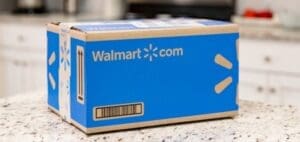 Amazon’s third-party marketplace has been continuing to grow, making its competitors rethink some of their policies in regard to marketplaces. Walmart has now removed rules requiring sellers on its marketplace website to be registered in the US in an attempt to close the e-commerce gap with Amazon and tap into China’s vast network of manufacturers. Walmart is looking to expand its marketplace, where suppliers can offer their products via the company’s website, and the services that branch off of it, like fulfillment and advertising. And starting this month, Walmart is opening up its marketplace to foreign sellers, who no longer need a US address or business tax identification. Walmart doesn’t disclose how many marketplace sellers it has, but Marketplace Pulse pegs it at about 80,000.
Amazon’s third-party marketplace has been continuing to grow, making its competitors rethink some of their policies in regard to marketplaces. Walmart has now removed rules requiring sellers on its marketplace website to be registered in the US in an attempt to close the e-commerce gap with Amazon and tap into China’s vast network of manufacturers. Walmart is looking to expand its marketplace, where suppliers can offer their products via the company’s website, and the services that branch off of it, like fulfillment and advertising. And starting this month, Walmart is opening up its marketplace to foreign sellers, who no longer need a US address or business tax identification. Walmart doesn’t disclose how many marketplace sellers it has, but Marketplace Pulse pegs it at about 80,000.
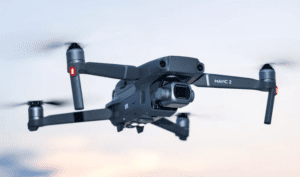 As the use cases and success stories of drone deliveries continue to mount, more and more companies are exploring the technology. And as we’ve seen in this space, the Covid-19 pandemic has sped up the process, especially for those looking to deliver essential supplies. Network provider O2 is working with drone company Skyfarer to get delivery drones into the air to deliver COVID-19 supplies and blood samples. The two are also working on creating the necessary infrastructure to fly the drones safely. The trial’s goal is to see if the delivery drones will be able to speed up patient response and sample turnaround times while also transporting blood transfusions in a shorter amount of time. The two companies already tested the technology last year during a trial to deliver PPE and COVID-19 test kits to the remote Argyll and Bute islands. This is the first time the tests have been brought to the mainland United Kingdom.
As the use cases and success stories of drone deliveries continue to mount, more and more companies are exploring the technology. And as we’ve seen in this space, the Covid-19 pandemic has sped up the process, especially for those looking to deliver essential supplies. Network provider O2 is working with drone company Skyfarer to get delivery drones into the air to deliver COVID-19 supplies and blood samples. The two are also working on creating the necessary infrastructure to fly the drones safely. The trial’s goal is to see if the delivery drones will be able to speed up patient response and sample turnaround times while also transporting blood transfusions in a shorter amount of time. The two companies already tested the technology last year during a trial to deliver PPE and COVID-19 test kits to the remote Argyll and Bute islands. This is the first time the tests have been brought to the mainland United Kingdom.
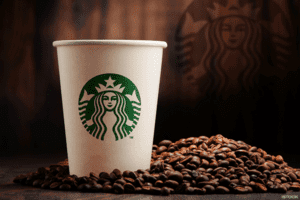 More and more food and beverage manufacturers and retailers are looking to increase their sustainability efforts, and Starbucks is no exception. The company is targeting greenhouse gas emissions by setting goals focused on farm practices and land usage to become carbon neutral for green coffee by 2030. Specifically, Starbucks said it would provide coffee farmers with precision agronomy tools, distribute climate-resistant coffee plant varietals, and invest in protecting and restoring coffee-producing lands, first, in Columbia and Peru. Starbucks also said it would cut water usage for green coffee 50 percent by 2030. The goals prioritize reducing emissions in how green coffee is grown before addressing the rest of the value chain, such as transportation, roasting or packaging.
More and more food and beverage manufacturers and retailers are looking to increase their sustainability efforts, and Starbucks is no exception. The company is targeting greenhouse gas emissions by setting goals focused on farm practices and land usage to become carbon neutral for green coffee by 2030. Specifically, Starbucks said it would provide coffee farmers with precision agronomy tools, distribute climate-resistant coffee plant varietals, and invest in protecting and restoring coffee-producing lands, first, in Columbia and Peru. Starbucks also said it would cut water usage for green coffee 50 percent by 2030. The goals prioritize reducing emissions in how green coffee is grown before addressing the rest of the value chain, such as transportation, roasting or packaging.
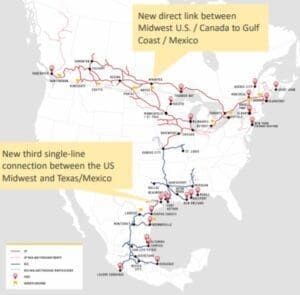 According to the heads of bot rail companies, Canadian Pacific’s proposed acquisition of Kansas City Southern will result in new service lanes across North America. The merger would connect customers with six of the seven largest metropolitan regions in North America, potentially reduce transit times and provide new product offerings, such as a possible new intermodal service between Dallas and Chicago, executives said. The merger would also enable north-south customers to avoid congestion-prone Chicago via CP’s network in Iowa. Unlike an interchange agreement between the two companies, a merger allows for opportunities to invest in capital projects for new lanes and asset turnarounds.
According to the heads of bot rail companies, Canadian Pacific’s proposed acquisition of Kansas City Southern will result in new service lanes across North America. The merger would connect customers with six of the seven largest metropolitan regions in North America, potentially reduce transit times and provide new product offerings, such as a possible new intermodal service between Dallas and Chicago, executives said. The merger would also enable north-south customers to avoid congestion-prone Chicago via CP’s network in Iowa. Unlike an interchange agreement between the two companies, a merger allows for opportunities to invest in capital projects for new lanes and asset turnarounds.
The United States Postal Service has finally unveiled its long-awaited 10-year reorganization plan, which includes an expansion of parcel delivery services. The parcel expansion, which has been branded USPS Connect, is projected to generate $24 billion in new net revenue by 2030, postal officials said. The agency will broaden its weekend parcel-delivery services, especially on Sundays. Under the reorganization, the Postal Service will offer same-day, next-day and two- to three-day deliveries covering its four package-delivery services: Priority Mail Express, Priority Mail, First-Class Package Services for deliveries weighing less than 1 pound and Parcel Select, in which the Postal Service collects packages dropped off at post offices by high-volume shippers for final-mile deliveries to residences.
That’s all for this week. Enjoy the weekend and the song of the week, Neil Young’s Be the Rain.
















